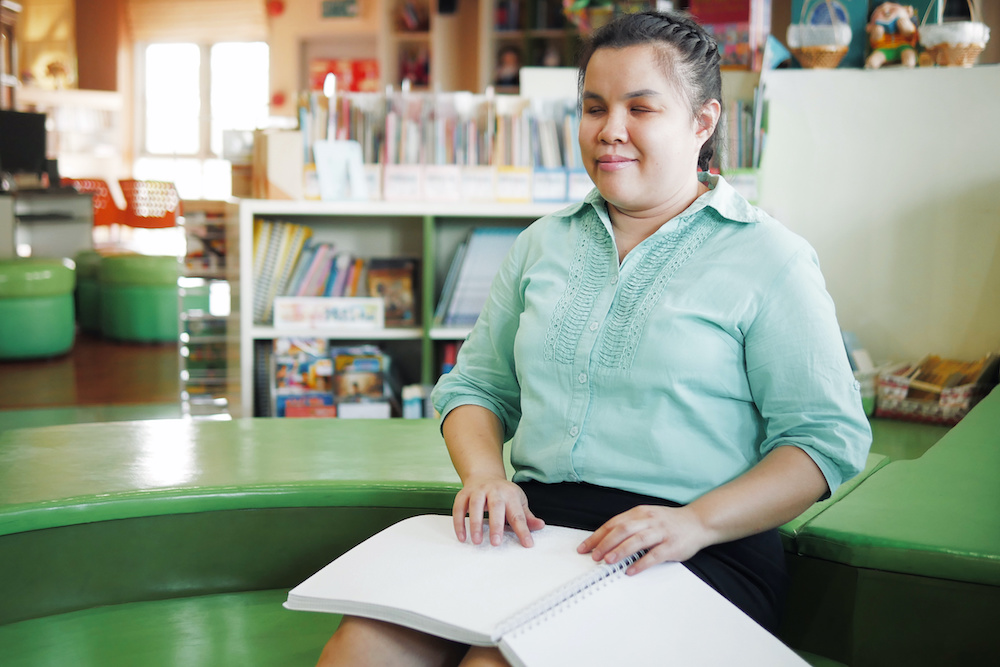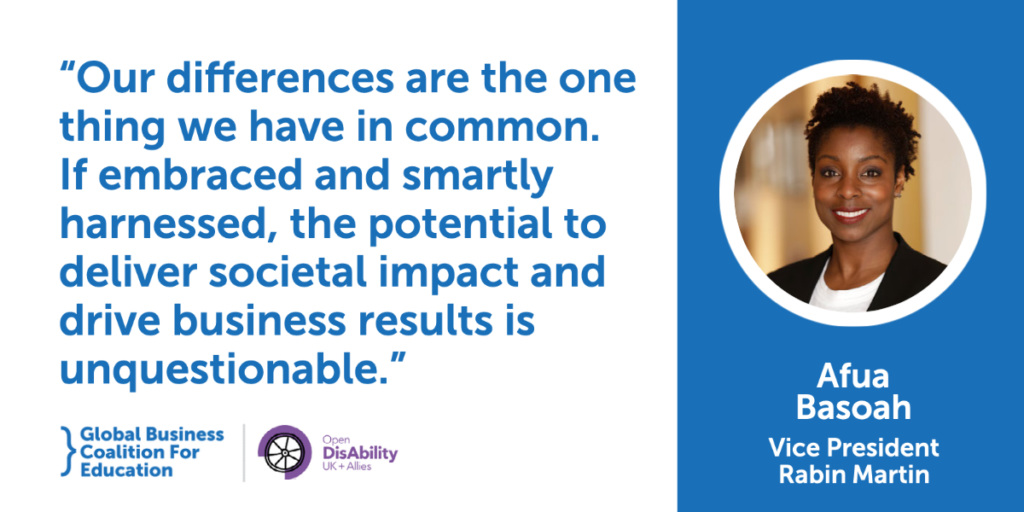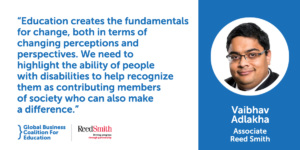Education & work for people with disabilities: a discussion With Omnicom & Reed Smith

My name is Vibhu Sharma, and I work with the Global Business Coalition for Education and Theirworld as the Disability and Inclusion Research Consultant. I am joined today, on the occasion of the International Day of Persons with Disabilities by two business leaders: Afua Basoah, Vice President and Head of London at Rabin Martin, a global health strategy firm that is part of the Omnicom group, and Vaibhav Adlakha, Associate specialized in Competition Law and Financial Regulation at Reed Smith.
The International Day of Persons with Disabilities has been observed since 1992 to promote an understanding of issues around disability and increase awareness of the advantages that can be derived from the participation and integration of persons with disabilities in political, social, economic and cultural life. The theme of this year’s International Day of Persons with Disabilities is “Building Back Better: toward a disability-inclusive, accessible and sustainable post-COVID-19 World.” Today, we are going to talk about how businesses can provide better educational and employment opportunities to young people with disabilities and create an inclusive environment.
What are your companies doing to provide employment opportunities to young people with disabilities?
Afua Basoah: Omnicom has long-focused on putting diversity and inclusion at the center of its business model. The Omnicom People Engagement Network (OPEN) is Omnicom’s umbrella group for all the company’s network employee engagement groups and activities. These groups work to foster an inclusive and engaging work environment and increase networking and business opportunities. In the UK, Omniwomen+Allies UK focuses on gender diversity and equality and OPEN Pride+Allies UK focuses on LGBTQI inclusion. In May 2019, under the auspices of #AbleToDoMore, Omnicom launched its first disability business resource group (BRG), OPEN DisAbility+Allies UK, which focuses on disability inclusion and representation. Supporting approximately 9,000 Omnicom UK employees, we are resolute in our ambition for this BRG: “Do more”. The emphasis of this BRG’s work has shifted from solely raising awareness of disability inclusion to providing practical tools and support to actively drive inclusion and representation. The committee has developed a #HowToDoMore Toolkit housed on Omnicom’s worldwide internal platform — a collection of tools and resources to support all agencies in their efforts to become “disability inclusion SMART”. The evolving toolkit includes a Disability Confident Guide and a Disability Experts Guide, among other vital information – for example, organizations providing great support.
 SeeAbility, one of the oldest disability organizations in the world and an avid partner of our business resource group, has a supported employment program, Ready, Willing and Able, that helps match individuals with disabilities with employer needs. Inclusivity is at the heart and soul of this program, which is the key to unlocking true inclusion in the workplace. This is one example of the type of information in the Disability Expert Guide.
SeeAbility, one of the oldest disability organizations in the world and an avid partner of our business resource group, has a supported employment program, Ready, Willing and Able, that helps match individuals with disabilities with employer needs. Inclusivity is at the heart and soul of this program, which is the key to unlocking true inclusion in the workplace. This is one example of the type of information in the Disability Expert Guide.
Vaibhav Adlakha: Reed Smith set up the Looking for Excellence and Advancement for people with Disabilities (LEADRS) group in 2012 taking inspiration from the Paralympics. We realized that people with disabilities were underrepresented in many professions. There was a gap in perspective, which meant that this particular group of talented individuals was falling through the cracks. Reed Smith also initially decided to reserve two places in their vacation schemes for people with disabilities to provide them with an opportunity to showcase their ability. The firm wanted to value the talent these individuals would have but at the same time not hire them only because of their disability. They work with various organizations, like My Plus Consulting, Employability, Wells Tobias, Aspiring Solicitors, and the Law Society’s Lawyers with Disability Division etc. so that the right talent can be given the opportunity to flourish. Reed Smith has also adapted their interview process to make it more inclusive, opting for a strength-based approach – the situational strengths test is untimed and the strengths-based interview, to give everybody an equal opportunity to succeed regardless of circumstances and experiences.
The firm also tries to nurture talent from schools and universities through its Responsible Business program and conducting Open Days for people with disabilities. Reed Smith was recognized as among the “Best Places to Work for Disability Inclusion” in the Disability Equality Index, and was the only law firm to receive a score of 100%, the highest attainable score in the index. The firm was also the winner of the Diversity Innovation category in the Legal Innovation Awards 2020 this year for enhancing collaboration between Responsible Business and Graduate Recruitment/HR teams, helping to create strategies to attract candidates with disabilities, and providing appropriate support once they join. Reed Smith has been recognized by Microsoft as a top performer in its UK Law Firm Diversity Program and received Microsoft’s Diversity & Inclusion Innovator Award. The firm believes in nurturing experience based on personal ambitions and on the requirements of the business. It identifies areas of strength and challenges, working through them in a collaborative manner, to create the best environment for working within the organization.
The firm has introduced a ‘Disability Etiquette Guide’ to ensure that the workplace is disability-confident and everyone at the firm feels comfortable working either as a person with a disability or with a disabled person to promote an inclusive and open culture. The Reed Smith Mental Health Task Force strives to cultivate and promote psychological and mental wellness, providing support when needed. The firm introduced the LEADRS Diversity & Inclusion Mentoring program in order to retain and help shape the careers of people with disabilities. Reed Smith is also a signatory to the Charter for Change, the official legacy document of the Global Disability Summit held on 24 July 2018 in London, to help ensure global consensus to address and support the rights of people with disabilities around the world.
The firm takes pride in celebrating Diversity & Inclusion and marks International Day of Persons with Disabilities (Purple Light Up) every year. This year, on 3rd December, Reed Smith is organizing a half-day conference targeting the employment of people with disabilities trying to find solutions together with potential employers. The firm has also presented to various clients and organizations on the value of hiring people with disabilities. Reed Smith is constantly evolving, trying to change mindsets and breaking down barriers. The firm may not succeed in every endeavor but hopes that by trying they can do better every time even if it may not lead to instant success. As Samuel Beckett says, “Ever tried. Ever failed. No matter. Try Again. Fail again. Fail better”. The firm hopes to be the conduit for change and play an important role in ensuring that true talent and ability is always recognized.
What do you think businesses can do to create a bridge between education and the workforce for young people with disabilities?
Afua Basoah: Incorporating inclusive working into the organizational values can have a positive impact on a business, staff, and one’s community. Many organizations are unaware of or unsure how to engage with various government programs and services available such as access to work (ATW) program, Kickstart, internships, apprenticeships, which can all be used in collaboration with a supported employment program to enrich one’s talent pool with those with disabilities. Most businesses employ interns to support delivery of projects. Not only is this a great way to ensure projects are appropriately resourced but importantly, it provides an opportunity to work with young people with disabilities.
Vaibhav Adlakha: Education creates the fundamentals for change, both in terms of changing perceptions and perspectives. It is important that we create greater awareness regarding the ability of people with disabilities in order to integrate and help recognize them as contributing members of society who can also make a difference.
 It is fundamental that organizations shift to the grassroots level, such as schools and colleges, to talk about career prospects. When I started my education in a “Spastic Society” school in India, I was not aware of any possibilities. It was only after I went to so-called mainstream schools and universities that I became aware of what was possible or that I could have dreams. If organizations make a special effort to inform people with disabilities that they are also a valuable workforce and resource, then that will do wonders for confidence and skill-building. Organizations can also help bridge the gap by imparting knowledge and skills that can serve people with disabilities in good stead, both in life and in careers. I think by nurturing talent and giving opportunities to develop, we can take steps to root out the possibility of unconscious bias.
It is fundamental that organizations shift to the grassroots level, such as schools and colleges, to talk about career prospects. When I started my education in a “Spastic Society” school in India, I was not aware of any possibilities. It was only after I went to so-called mainstream schools and universities that I became aware of what was possible or that I could have dreams. If organizations make a special effort to inform people with disabilities that they are also a valuable workforce and resource, then that will do wonders for confidence and skill-building. Organizations can also help bridge the gap by imparting knowledge and skills that can serve people with disabilities in good stead, both in life and in careers. I think by nurturing talent and giving opportunities to develop, we can take steps to root out the possibility of unconscious bias.
It may also be possible for firms to support education initiatives targeted at people with disabilities. However, it all boils down to having the right attitude and desire to change perspectives and to help to facilitate possibilities.
What has your company done to better support, integrate, and empower people with disabilities in your teams? What were the main challenges and how did you overcome them?
Afua Basoah: The #HowToDoMore Toolkit housed on Omnicom’s worldwide internal platform — is a collection of tools and resources to support all agencies in their efforts to become “disability inclusion SMART”. Integration is the next step – and where the challenge comes. Every agency will be at a different stage of their journey towards ‘disability inclusion’ – acknowledging that is important and focusing on progress. Collaboration is the only way to accelerate integration of inclusive working practices. Tapping into established best practices and expertise is critical. Some companies may have made significant headway in one or two diversity areas, e.g. gender equality, sexual orientation. For these teams, the topic of intersectionality is particularly helpful to broaden and catalyze the integration of other diversity categories, such as disability. There are no quick fixes as change goes beyond simply meeting quotas – sustainable change requires cultural shifts, that take time. We advise that companies focus on consistent progress, however small, because we are all able to do more.
Vaibhav Adlakha: Reed Smith believes in focusing on the ability of individuals. The firm works with its people to understand their disability and what might work best for them. It also works with the team to understand the requirements of the department and ensures that people with disabilities can integrate themselves to become an integral part of the team. The firm tries to identify the challenges that might be faced and works towards finding creative solutions. This is important because sometimes the traditional way of working might not be suitable for people with disabilities. The biggest challenge in this respect is to have departments and people with disabilities feel comfortable in their work environment. This requires a degree of mental adjustment and thinking outside the box as to how both parties can benefit from each other. This is the challenge organizations continue to face and some departments have been able to make the mental adjustments better than others. In addition, not all disabilities may work in the same way across every department. Therefore, the biggest challenge is to be able to find the perfect environment where the skills required for the department match the skills offered by the individual with a disability. Reed Smith works with organizations, like Access to Work and the Royal British Legion to ensure that everything is in place for both the department and for people with disabilities to feel secure and perform at their best.
What have you done to ensure your colleagues with disabilities feel included and engaged in your company’s work while working at home?
Afua Basoah: Each agency has employed strategies that work best for their teams. At Rabin Martin, we held more frequent firm-wide check-in sessions and individual check-ins to keep an eye on all staff – It has been an extremely challenging year for so many. Knowing that everyone will have different requirements to get through it has been our starting point.
Vaibhav Adlakha: I think that for many people with disabilities, coronavirus has presented both challenges as well as opportunities. It has allowed them to work flexibly without having to travel, something that they may not have been able to advocate for at work. For many, such as myself, it has represented an opportunity to showcase my ability as a lawyer even more greatly, given the change in firm priorities and increase in work due to the amendments in the law.
Even before we went into lockdown, Reed Smith arranged all equipment to be potentially set up for anyone requiring it. Our IT team worked tirelessly to ensure that everyone remains connected with clients as well as one another. Work, therefore, went on seamlessly with everyone being able to communicate effectively. The departments have also ensured that there are regular department calls not only to discuss work matters but also personal wellbeing. LEADRS arranges virtual coffee sessions twice a week where people can meet and discuss various issues. We also have check-ins and departmental social activities. The firm organizes Connection Events locally as well as across offices. We understand that such a situation presents challenges for mental health. Therefore, the Mental Health Task Force and HR have put in place various initiatives and policies to improve flexibility allowing people to balance work and personal priorities.
